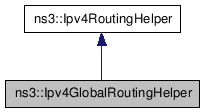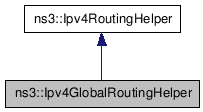ns3::Ipv4GlobalRoutingHelper Class Reference
Helper class that adds ns3::Ipv4GlobalRouting objects. More...
#include <ipv4-global-routing-helper.h>


Public Member Functions | |
| virtual Ptr< Ipv4RoutingProtocol > | Create (Ptr< Node > node) const |
Static Public Member Functions | |
| static void | PopulateRoutingTables (void) |
| Build a routing database and initialize the routing tables of the nodes in the simulation. Makes all nodes in the simulation into routers. | |
| static void | RecomputeRoutingTables (void) |
| Remove all routes that were previously installed in a prior call to either PopulateRoutingTables() or RecomputeRoutingTables(), and add a new set of routes. | |
Detailed Description
Helper class that adds ns3::Ipv4GlobalRouting objects.Member Function Documentation
| virtual Ptr<Ipv4RoutingProtocol> ns3::Ipv4GlobalRoutingHelper::Create | ( | Ptr< Node > | node | ) | const [virtual] |
- Parameters:
-
node the node on which the routing protocol will run
- Returns:
- a newly-created routing protocol
Implements ns3::Ipv4RoutingHelper.
| static void ns3::Ipv4GlobalRoutingHelper::PopulateRoutingTables | ( | void | ) | [static] |
Build a routing database and initialize the routing tables of the nodes in the simulation. Makes all nodes in the simulation into routers.
All this function does is call the functions BuildGlobalRoutingDatabase () and InitializeRoutes ().
| static void ns3::Ipv4GlobalRoutingHelper::RecomputeRoutingTables | ( | void | ) | [static] |
Remove all routes that were previously installed in a prior call to either PopulateRoutingTables() or RecomputeRoutingTables(), and add a new set of routes.
This method does not change the set of nodes over which GlobalRouting is being used, but it will dynamically update its representation of the global topology before recomputing routes. Users must first call PopulateRoutingTables() and then may subsequently call RecomputeRoutingTables() at any later time in the simulation.
The documentation for this class was generated from the following file:
- src/helper/ipv4-global-routing-helper.h
 1.5.8
1.5.8